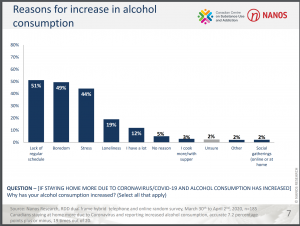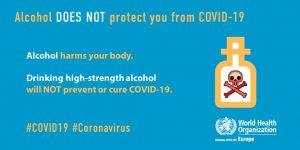The Now
COVID-19 has taken the world by storm, forcing whole countries to shut down and people to self-isolate. Whilst self-isolation and the shutdowns are effective methods of preventing the spread of COVID-19, they also have their collateral effects. A recent report published by the Canadian Centre on Substance Use and Addiction found that 25% of Canadians (aged 35-54) are drinking more while at home during the COVID-19 pandemic because of either boredom, stress, and/or lack of a regular schedule.

Image: Nanos/Canadian Centre on Substance Use and Addiction
A similar increase was seen in Australia where there was an increase of around 30% in alcohol bought compared to last year. Alcohol while being a great way to relax also has many negative effects that in a time such as the COVID-19 pandemic can result in some very dangerous situations.
The Truth
One misconception about alcohol that has been debunked by the World Health Organization (WHO) was that drinking alcohol can provide you extra immunity against the COVID-19 disease.

Image: WHO/Europe /Twitter
In contrast, a study concluded that alcohol might increase one’s vulnerability to the COVID-19 disease. Alcohol consumption has a documented role in disrupting one’s immune system. It can do so by disrupting physical, chemical, and cellular responses that are apart of the body’s first line of defense. Furthermore, alcohol can impair t-cell recruitment which means there is a lower number of total white blood cells that can go out and destroy the invaders, this results in a weaker immune system. This can be dangerous especially with COVID-19 looming as a strong immune system can help fight off COVID-19 with ease but with a weak one COVID-19 becomes a much greater threat.
From this, it can be understood that limiting the number of alcoholic drinks that you intake to a low-to-moderate amount will be beneficial for you.
Dr. Charity Baker states “Alcohol isn’t healthy and never was”
Alcohol can not only damage the immune system, but there is also a growing concern that the sudden increase in alcohol usage during the COVID-19 pandemic may result in greater cases of alcoholism. This is a concern as it can lead to many health problems that range from mental disorders to liver/heart problems; in a family setting, this can result in domestic violence and child negligence which can develop into many other long-term problems such as Post-Traumatic Stress Disorder (PTSD).
The Future
The future is dependent on what actions people decide to take now. The increase in alcohol drinking which is collateral of COVID-19 can become a problem if not addressed properly. The way to prevent an increase in alcoholism and all of the consequential problems is to lower your alcohol intake to a low-to-moderate amount, which is considered to be a maximum of 1 -2 drinks a day. The societal and economical effects of COVID-19 are here to stay for many years. If alcohol drinking is not controlled during this COVID-19 pandemic, these effects will also persist for many more years to come.
– Harman Sandhu
